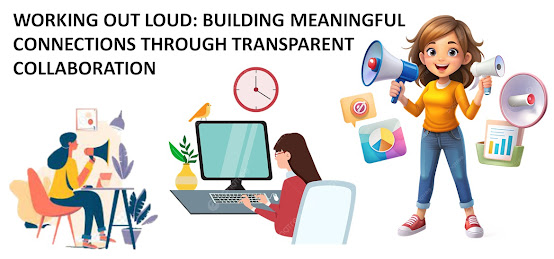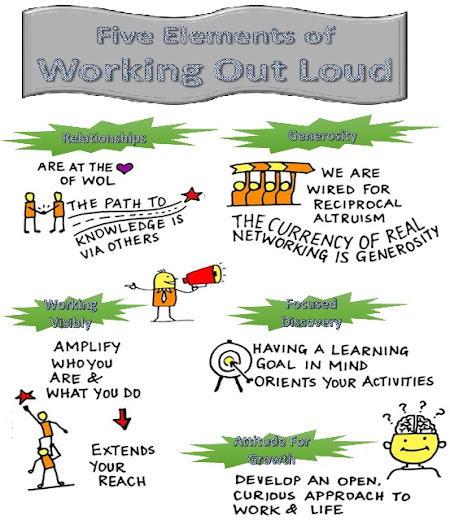Working Out Loud is a practice of sharing your work/work in progress with a relevant community to enable learning and collaboration.
In an increasingly digital and decentralized
world, traditional models of teamwork are evolving. Enter Working Out Loud (WOL) —
a transformative approach that promotes purposeful sharing, deep collaboration,
and relationship-driven professional growth. Unlike solitary workflows or
hidden efforts, WOL encourages individuals to make their work, learning, and
challenges visible to others in a structured way. By doing so, people create
value not just for themselves, but for their networks, organizations, and
communities.
At its core, Working Out Loud is not just about sharing for the sake of visibility. It's about building trust, making meaningful connections, and discovering opportunities through open, generous collaboration.
The Five Elements Of Working Out Loud
1. Relationships:
WOL begins with cultivating authentic relationships. Instead of networking to "get something," you connect to contribute and collaborate. Example: An employee from the HR department starts engaging with software developers via internal forums to better understand their needs, leading to more tailored policies.
2. Generosity:
Share your knowledge, resources, and insights without expecting immediate returns. Generosity fosters trust and long-term collaboration. Example: A marketing executive openly shares a campaign template on the company blog, helping teams across geographies build their own versions.
3. Purposeful Discovery:
Be intentional about your goals and curious about new ways to reach them. Actively explore connections and knowledge that align with your learning path. Example: A designer researching accessibility standards joins a Slack group focused on inclusive UX design and discovers collaboration opportunities on external projects.
4. Visible Work:
Make your progress, challenges, and learning visible to others. This transparency invites collaboration and support. Example: A data analyst documents their workflow and regularly posts updates on the company's project wiki, making it easier for others to build upon their work.
5. Growth Mindset:
Embrace challenges and view mistakes as learning opportunities. A growth mindset encourages resilience and adaptive learning. Example: A product manager reflects publicly on a failed feature launch, discusses lessons learned, and invites feedback from the community.
Actionable Steps To Start Working Out Loud
Define Your Goal:
Choose a meaningful objective you'd like to make progress on, whether it's
learning a new skill, improving a process, or building a professional network.
Identify Your Audience: Think about who might benefit from or contribute to your journey. It
could be peers, mentors, or professionals in your industry.
Choose a Platform: Select a medium to share your progress. Internal tools (like company
intranets or Slack) or public platforms (like LinkedIn or Medium) can work well.
Share Regularly:
Post updates on what you’re learning, problems you're tackling, and questions
you have. Be honest, specific, and open.
Engage and Collaborate: Respond to feedback, join discussions, and highlight others’ work.
Collaboration fuels momentum.
Reflect and Iterate: Periodically review your progress, refine your goals, and celebrate the relationships and knowledge you've gained.
Real-World Examples of Working Out Loud: How Indian Innovators and Organizations Lead with Transparency, Generosity, and Purpose
1. Relationships: Kunal Shah – Founder of CRED
Kunal Shah frequently engages with his
community on Twitter/X and LinkedIn, not to pitch products, but to share
insights and ask thoughtful questions. His approach fosters real conversations
that strengthen his professional relationships and attract talent and ideas to
his ventures.
WOL Principle: He nurtures authentic, give-first relationships that aren’t transaction-based.
2. Generosity: Zoho Corporation
Zoho is known for sharing knowledge and
tools freely, especially supporting startups and small businesses during crises
(e.g., free access during the COVID-19 lockdowns). Their webinars, open-source
projects, and community support are rooted in a spirit of giving.
WOL Principle: They lead with generosity, offering value before asking for anything in return.
3. Purposeful Discovery: Tanmay Bhat – Content Creator & Entrepreneur
Tanmay evolved from a comedian into a
startup mentor, content strategist, and investor. He openly documents his
learning journey in the startup and creator economy, purposefully connecting
with founders, creators, and marketers.
WOL Principle: He aligns his curiosity with long-term goals and is intentional about discovery.
4. Visible Work: Nithin Kamath – Founder of Zerodha
Nithin regularly blogs about Zerodha’s
innovations, business decisions, failures, and learnings. This radical
transparency builds public trust and attracts community-driven feedback.
🔍 WOL Principle: He makes business strategies, experiments, and challenges visible, sparking meaningful dialogue.
5. Growth Mindset: Byju Raveendran – Founder of BYJU’S
Byju often speaks about his early setbacks
and how the company learned from product missteps. He encourages
experimentation, especially in edtech, where adapting to student feedback is
critical.
WOL Principle: He embraces failure as fuel
for innovation and collective growth.
Conclusion
Working Out Loud is more than a method — it's a mindset shift. It turns daily work into a shared journey, promotes purposeful connection, and creates an environment where generosity and curiosity thrive. Whether you're a freelancer, a team leader, or part of a global enterprise, adopting WOL can transform how you learn, collaborate, and grow. Start small. Share with intention. And build the network that helps you thrive.



Comments
Post a Comment